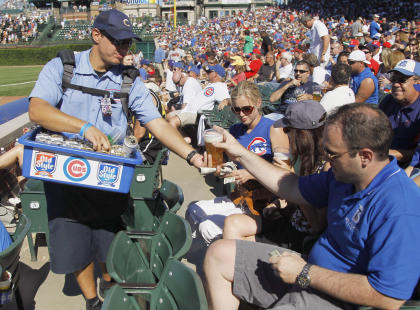Next Victim of Technology: The Stadium Hot-Dog Vendor
The food isn’t always fresh or affordable, yet the roving vendor shouting “Peanuts!” or “Beer Here!” is a timeless cultural fixture at stadiums across the country, where millions of Americans have experienced the thrill of victory and the agony of defeat.
Perhaps not for much longer, though.


MasterCard (MA) is rolling out a digital app called QkR (pronounced “quicker”) that, among other things, could streamline the process of ordering food at a stadium. It’s currently being tested at Yankee Stadium in New York, in Section 130 (field level, left-field line, regular ticket price $83-$105). The system is already up and running in stadiums in Ireland and Australia, and it’s based on technology that’s essentially proven. So it seems likely to catch on in American venues unless fans reject it.
The MasterCard technology would civilize the current unruly system. From your seat, you’d use the QkR app on your smartphone to scan one of those puzzle-like quick-response codes on the seatback in front of you. That would call up the stadium’s concession menu and indicate where, exactly, you’re sitting. You’d tap on your phone to order your hot dog, pretzel, beer or gelatinous nacho dip. Your order would materialize at a nearby concession stand, and the charge would be billed to your MasterCard account. A runner would deliver the food to your seat once it’s ready.
Smoothing the flow
Such digital orders would solve a couple of problems. Every sports fan knows what how excruciating it can be when you’re deliberating over how to order food at a live event. You can wait for a vendor and buy whatever he happens to be hawking. Or, you can get exactly what you want by trekking to the concession stand. But that poses another Hobson’s choice: Wait till there’s a break in the action and get in line with everybody else? Or try to beat the line but risk missing the play of a lifetime? Ordering from your seat would take the stress out of the process and smooth out the flow for the concessionaires as well.
Traditionalists may balk, but the idea sounds like a winner to some fans. “You can’t plan when vendors are coming or what they’re bringing,” says Marc Normandin, a 27-year-old Boston Red Sox fan who’s also an editor at sports site SBNation.com. “The beer guys usually bring Heineken or Bud Light, so I have to go up to the concourse to find a specific beer like Sam Adams or Harpoon. If I didn’t have to go on a hike every time I wanted a beer, that would be a positive.” If he paid for stadium food using credit, he adds, he might have more cash in his pocket to tip the people delivering the food.
MasterCard, for its part, isn’t trying to drive anybody out of business. Like many other big companies, it’s trying to find new ways to capitalize on digital technology and boost revenue by offering clever new services. The trend, in general, seems unstoppable. Merchants such as Starbucks (SBUX) and Dunkin’ Donuts (DNKN) offer mobile apps that let you ring up an order using nothing but your smartphone. Others are sure to follow. Trendy new quick-serve chains such as The Melt employ digital ordering and other tech touches that appeal to hipsters. McDonald’s (MCD) is testing an app for mobile ordering that could transform the whole fast-food industry if it catches on nationwide.
MasterCard’s QkR app, along with similar apps from competitors such as Visa (V) and American Express (AXP), will probably find plenty of uses far beyond stadiums. Parents in Australia already use QkR to order and pay for school lunches for their kids, an idea that could easily spread to America. Overall, plastic credit cards are probably on their way out, to be replaced by digital apps that offer more functionality and security, and take up no additional space in your pocket. Banks and credit-card companies, in fact, are competing mightily for dominance at thousands of retail checkout counters, once it becomes clear what kind of technology will prevail and merchants begin to install the card readers of the future.
As for vendors lugging trays of food up and down stadium steps, they may have to resign themselves to the forward — and sometimes ruthless — march of technology. It’s no secret that computers, digitized gizmos and the Internet have made millions of workers obsolete. (When was the last time you called a travel agent or shopped at a record store?) Some economists think digital technology is even responsible for the hollowing-out of America’s middle class.
So the hot-dog man may have to take his place next to typewriters and rotary phones as a relic of the 20th century. Unless he starts selling gadgets and chargers.
Rick Newman’s latest book is Rebounders: How Winners Pivot From Setback To Success. Follow him on Twitter: @rickjnewman.

